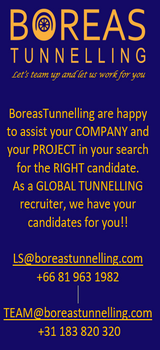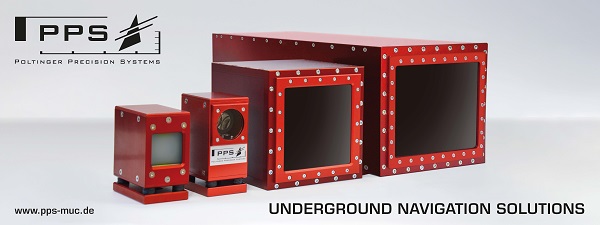Grand Paris Express tunnel construction improves employee safety with wearable technology
I read this. Important for workplace tunnel construction safety. Every tunnel must have this (I copy the writing):
Worker Tracking & Safety Monitoring in Construction:
UWB RFID Brings Security to Grand Paris Express
Worker tracking RTLS system: Paris Metro is monitoring the security of hundreds of construction workers in tunnels as it expands its underground rail line. The current tunnel project was launched in March 2018, with another phase beginning in March of this year.
The worker tracking/safety system that accompanies the construction project consists of UWB RFID-based sensors worn by personnel, which are read by a network of receivers, as well as sensors mounted throughout the tunnel for emergency reporting. The solution is provided by using UWB RFID technology from Litum IoT.
Client Background
The project, known as the Grand Paris Express, commenced in 2017, is overseen by public enterprise Société du Grand Paris and consists of multiple new rapid-transit lines in the Paris region. The latest rail line comprises five stretches of tunnel, totaling 33 kilometers (20 miles) of tunnel; it requires approximately 400 workers and relies on equipment such as a tunnel boring machine (TBM) to drill out the tunnel. The organization sought a system that would ensure worker safety throughout the multi-year project.
Project scope
The project had to meet sector-specific and very strict safety regulations, especially in worker tracking and safety. Main requirements based on which all safety rules are defined were as follows; ensuring only authorized workers were in restricted areas, not exceeding number of workers in specific areas (which change constantly with the movement of workers and construction itself), ensuring all workers followed directions, and being able to react quickly in potential cases of emergency. Additionally, the group needed the system to minimize collision risks between employees and the TBM, as well as equipment moving on rails. Thus, the need for a customized system for safety management within the challenging environment required an innovative solution.
The Worker Tracking Technology & Solution
Litum designed an RTLS system developed with UWB RFID technology, which utilizes RTLS tags (transmitters) and RTLS anchors (receivers) that operate on a mesh network structure.
Litum manufactured the system, including the RTLS UWB anchors [readers], tags, firmware and software in addition to providing installation and ongoing support. In the tunnel itself, 48 anchors (readers) were installed that capture transmissions from the badges. Each anchor has a read distance of 150 meters (492 feet) aboveground and about 100 meters (328 feet) in the tunnels.
The tags of workers are matched with their ID’s and worn by attaching their helmet. The system wirelessly forwards each tag ID, along with its location to the gateway anchor via the mesh network structure. The gateway then forwards the data to the Litum’s cloud based software in order to update the individual’s position and movement. The precise location of tags is calculated by Litum’s location engine software by using proprietary algorithms. That location can be calculated with an accuracy of about 50 centimeters (19.7 inches). Thus, as each worker moves around the worksite and through the tunnel, his or her location is displayed on a dashboard map as a dot. In that way, management can view where all personnel are located in real time, as well as collect and store historic data.
In the event of an incident, such as an unauthorized individual entering a restricted area, an alert is issued directly to managers or supervisors onsite, who can then quickly address the problem. In case of the emergencies that might take place onsite, system manager can send alert to employee badges individually or collectively to warn them. In addition, RTLS UWB nodes are installed throughout the tunnel, every 100 meters (656 feet). Those nodes come with a button that can be pressed to activate the alarm system, which enable workers to activate alarm system if needed. The two-way nature of the communication makes emergency alarm management easier. When alarm activated, evacuation is safer and much safer through the software that displays each worker’s location.
One of the main challenges facing the technology was to create a network within underground tunnels and another was to provide products that can withstand harsh working environment. The team used amplifiers to enhance bandwidth and Litum produced IP67-rated hardware that is durable for harsh working conditions
Project scope
The project had to meet sector-specific and very strict safety regulations, especially in worker tracking and safety. Main requirements based on which all safety rules are defined were as follows; ensuring only authorized workers were in restricted areas, not exceeding number of workers in specific areas (which change constantly with the movement of workers and construction itself), ensuring all workers followed directions, and being able to react quickly in potential cases of emergency. Additionally, the group needed the system to minimize collision risks between employees and the TBM, as well as equipment moving on rails. Thus, the need for a customized system for safety management within the challenging environment required an innovative solution.
The Worker Tracking Technology & Solution
Litum designed an RTLS system developed with UWB RFID technology, which utilizes RTLS tags (transmitters) and RTLS anchors (receivers) that operate on a mesh network structure.
Litum manufactured the system, including the RTLS UWB anchors [readers], tags, firmware and software in addition to providing installation and ongoing support. In the tunnel itself, 48 anchors (readers) were installed that capture transmissions from the badges. Each anchor has a read distance of 150 meters (492 feet) aboveground and about 100 meters (328 feet) in the tunnels.
The tags of workers are matched with their ID’s and worn by attaching their helmet. The system wirelessly forwards each tag ID, along with its location to the gateway anchor via the mesh network structure. The gateway then forwards the data to the Litum’s cloud based software in order to update the individual’s position and movement. The precise location of tags is calculated by Litum’s location engine software by using proprietary algorithms. That location can be calculated with an accuracy of about 50 centimeters (19.7 inches). Thus, as each worker moves around the worksite and through the tunnel, his or her location is displayed on a dashboard map as a dot. In that way, management can view where all personnel are located in real time, as well as collect and store historic data.
In the event of an incident, such as an unauthorized individual entering a restricted area, an alert is issued directly to managers or supervisors onsite, who can then quickly address the problem. In case of the emergencies that might take place onsite, system manager can send alert to employee badges individually or collectively to warn them. In addition, RTLS UWB nodes are installed throughout the tunnel, every 100 meters (656 feet). Those nodes come with a button that can be pressed to activate the alarm system, which enable workers to activate alarm system if needed. The two-way nature of the communication makes emergency alarm management easier. When alarm activated, evacuation is safer and much safer through the software that displays each worker’s location.
One of the main challenges facing the technology was to create a network within underground tunnels and another was to provide products that can withstand harsh working environment. The team used amplifiers to enhance bandwidth and Litum produced IP67-rated hardware that is durable for harsh working conditions
Achievement Unlocked: Risk Free Operations
Paris Metro has used the system for firefighting exercises ever since it was installed. The technology proved useful during those exercises, managers could follow the progress of their staff from the control room. With regard to alerting, the system sends automated e-mail alerts to personnel and managers related to maintenance requirements or other factors. E-mails are used rather than SMS text messages, since there is no GSM cellular signal in the tunnels, whereas there is an available Wi- Fi signal.
Spanish startup Worldsensing aims the same market for tunnels.
Spanish industrial IoT startup Worldsensing receives EUR 10 mln EIB funding
IOT : all our innovative projects - Worldsensing
www.worldsensing.comWe set out to develop innovative technology with the potential to overcome global challenges.
cover tunnel photo by: Matt Brown from London, England / CC BY
Copyright 2019-2024 TunnelContact.com








We have now deployed this RTLS system on 5 different projects, with 14 tunnels totalling over 40 km, and we have integrated it with our other systems (lighting, alarm cabinets...).